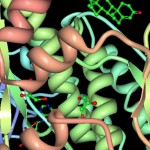
David Jhave Johnston responds to Theadora Walsh's review of his book Aesthetic Animism: Digital Poetry's Ontological Implications.
I am honored to offer a brief informal response to Theadora Walsh’s review on EBR of my book Aesthetic Animism: the Ontological Implications of Digital Poetry.
First, a personal aside that segues into relevance … In chatting with Lai-Tze Fan after she invited me to write a response, I mentioned that I was mostly just a bit shocked (and pleased) to have received a review; I had self-esteem issues. And she asked if that’s how I really wanted to frame my response? And I, -- recognizing her wisdom -- sighed (thru chat) No, probably not.
But on second thought, digital poets toil in the shadows of Hollywood, MLA, hiphop, unicorns, ad-agencies, the art world, deep learning, and oligarchies; so most of the artists and critics in the e-poetry field can be considered as almost devotional maniacs sacrificing a rational career path in order to follow a somewhat nebulous emergent mediated epiphany. Self-worth issues are part of that package. That explains why I was happy to receive a review in a reputable venue that didn’t shred the book along the numerous fault lines that my intimacy with it makes palpable.
In Aesthetic Animism, I tried as much as possible to be of service to a community. Comprehensively and inclusively nodding to as many core key works as I could. To gather, compile, and catalog. I was happy that Theadora Walsh recognized that emphasis on “examples”. However, after the book was published, I swiftly realized how many gaps existed: a few major creators almost totally ignored, many misinterpreted -- distortions marred my hoped-for-service. I began to feel guilty for omissions. I began to worry I would be hated.
To worry about hate may sound like neurotic nonsense, but within systems of attention scarcity, -- and let’s agree that digital poetry does not attract either venture capital or meme vultures, but is scavenging along diligently within partial scarcity -- turmoil strikes when egos, raised on the milky myth of genius, encounter the actuality of relative neglect, normative life, lithe minimal praise, gleaned attention. And it is in this lacuna from the central torrent of societal accusations that as a discipline, exchange occurs.
Theadora Walsh’s review begins with
David Jhave Johnston’s Aesthetic Animism is like the most erudite and well-researched Wikipedia page to have ever been committed to permanent form.
I laughed when I read the word ‘Wikipedia’ : it’s such a wonderful resonant complex contemporary compliment. Wikipedia may (in my mind, and perhaps in Theadora’s conception), strangely and paradoxically, represent the epitome of thoroughness: open, crowd-sourced, reviewed, fact vetted, and constantly revised; in ways, it outperforms peer-review (if you doubt this fact, consider science’s current internal conflict with reproducibility); Wikipedia for me represents a model for research that traditional humanities scholars may now question or even revile, but all utilise. Imagine a future where each book accepts comments, error corrections, and revisions. ELMCIP implements some of this texture.
What about a theoretical Github allowing forks of theory?
Here’s another insightful phrase from Theodora Walsh:
Aesthetic Animism is written in prose that metabolizes the academic through the sensibility of a poet.
Metabolism, Stephanie Strickland sternly (and correctly) warned me, in her editorial suggestions to an early draft of the book, is not used precisely in Aesthetic Animism. Yet, in some ways, metabolism is at the core of the project: to seed a density of description and examples that might allow e-poetry to conceive of itself as an autonomous organism. And, as Walsh correctly intuits, inserting the metaphoric sensibility of poetry into theory is a stylistic goal.
Johanna Drucker, Talan Memmott and many others (among them EBR luminary Davin Heckman) have already explored a hybrid poetry-theory terrain for e-lit. Drucker with extreme dexterity utilises language in a register that is close to a theoro-poetics. Memmott extruded theory into poetic-interfaces. Outside, the domain of e-lit, innumerable practitioners fuse word-poet-play with synaptic process: Lisa Robertson, John Berger, Susan Sontag, Jacques Derrida... So the membrane between poetry and theory is not sacrosanct but is a border that requires navigation. EBR editor Lai-Tze Fan, expresses the tendency as “writing as both a digital poet and scholar: where some content resists classic form”. Fan again offers an intriguing enigmatic commentary on the vital necessity of this growing process:
“photography and cinema’s failure to be those referents is shared by poetry’s grasping to become, making techniques of gesturing towards difference (montage, intertextuality, and so forth) relevant in much of twentieth century art and literature. “Suchness” and “thisness,” or, vitality and contingency”
Theory, when vivid and visceral, often involves mergers of analytic rigor with anecdotes, mashups of wordplay with formal necessity.
Theadora Walsh’s review does offer a nuanced correction:
Perhaps, in his desire to share the eudemonia he imagines promised by aesthetic animism, Johnston too quickly eschews the materiality of existence. …[]... Lisa Nakamura’s writing usefully tempers Johnston’s enthusiasm. She warns that “in order to think rigorously, humanely, and imaginatively about virtuality and the post-human, it is absolutely necessary to ground critique in the lived realities of the human. The nuanced realities of virtuality—racial, gendered, Othered—live in the body.”
Yes, I agree. Nakamura extends N. Katherine Hayles’ notion of embodiment into race. These are not the primary pivots I work with, but are crucial to “ground critique”. In these turbulent polarized times, the virtual is physical, ideology is intimate, and artificial intelligence reflects cultural biases and prejudices. The melting-pot of apparent intercultural happiness (eudemonia) often disguises or justifies systemic inequity, or utilises appropriation for exploitation by privilege. As Fan notes: “Theadora says that ‘the world writes upon our bodies’... ”. Soon the AI will write on us with us. Until then we write to each other.